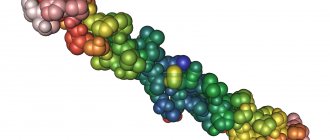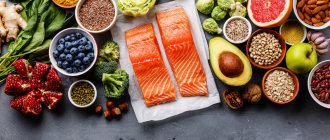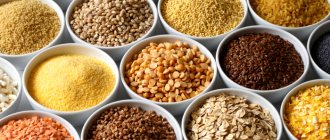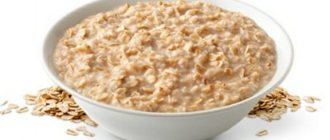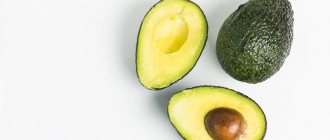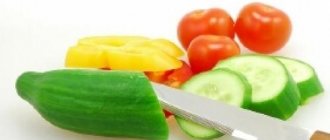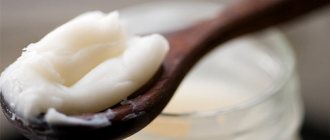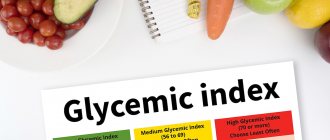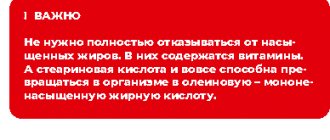July 17, 2012
Traditionally, fats are considered an unhealthy food. Let's look at why the term "good" fats is not an oxymoron.
Traditionally, fats are considered an unhealthy food. They are usually blamed for almost all diseases, from cardiovascular diseases to diabetes. However, there are different types of fats: good, bad and very bad. All of them have different effects on human health. Let's look at why the term "good" fats is not an oxymoron.
Deceiving food
There is also fat in doctor's sausage, but due to the fine grinding of the minced meat it is difficult to notice. Learn more about where to look for hidden fat and added sugar.
A short excursion into why fats are so important
- Back in the 90s, the world press actively popularized the opinion that fats are bad. They were rejected, and products with a “low-fat” sign on the packaging were bought up in unlimited quantities. But the absence of fat in food is by no means a panacea for excess weight. And only quite recently the masses began to perceive fats as a healthy nutritional element: along with proteins, carbohydrates, vitamins, minerals...
- promote the production of hormones;
- provide cells with the necessary energy support;
- regulate heat exchange, which is especially important during cold weather;
- form cell membranes.
Lipids have a number of useful functions:
The body will not function normally without fats. However, not all of them are equally useful. Some you really have to give up in order to effectively lose weight.
Harm and benefit
In a simplified sense, fat is the main source of energy for the body (80% of human energy reserves). Vegetable oil contains various acids, phytosterols, and phospholipids, which are absolutely important for normal metabolism. Nutritionists strongly recommend completely abandoning solid and animal fats, because vegetable oil has more beneficial properties:
- polyunsaturated acids omega-6 and omega-3 are not produced by the human body, but are vital for health (prevent blood clots and increased blood pressure);
- vegetable oil stimulates tissue regeneration;
- natural first cold-pressed oils - suppliers of large amounts of vitamin E, which has a positive effect on the condition of the skin;
- vegetable fats are minimally involved in the formation of bad cholesterol, which provokes atherosclerosis;
- metabolic processes are accelerated;
- blood composition normalizes;
- proper nutrition, balancing the vegetable and meat components in the diet, promotes weight loss;
- the immune system is strengthened;
- a strong cell membrane is formed;
- heart function is normalized;
- the strength and elasticity of blood vessels increases;
- retinol and similar substances protect the body from radiation exposure, reduce the risk of cancer, diabetes, and activate protein synthesis.
It is impossible to unambiguously determine the harmfulness of fats, since the negative effect directly depends on the amount consumed and the method of processing the oil. Such a product can also be harmful if you use it exclusively, completely abandoning animal lard. A cheap product of plant origin, with fanatical adherence to diets, provokes serious consequences:
- an excess of vegetable fats without a balance with animals can cause infertility in women;
- after severe heat treatment, oxidized polyunsaturated fats provoke thinning of the artery walls;
- oxidized fats are not absorbed by the body, but settle on the walls of blood vessels, which in the future provokes heart pathologies, cancer, obesity, and diseases of the gastrointestinal tract.
- Diet for hepatitis C
- How to download music to ipod
- How to disable paid services on Megafon yourself through your personal account online, via SMS and ussd request
Unsaturated fats
When talking about the benefits of lipids for the heart and blood vessels, it is important to take into account that we are talking about unsaturated fats. They play an important role in losing weight, preserving a person’s beauty, energy, and health.
Unsaturated are a type of lipids that are necessary for the construction of new cells in the body. In addition, they are responsible for metabolism. Up to 20% of unsaturated fats are used to ensure the functioning of human organs and systems.
Unsaturated fats are either monounsaturated or polyunsaturated. They are valued for a number of beneficial effects on the body. But where can you find these healthy fats? Monounsaturated - present in olive oil, avocado, nuts. Polyunsaturated – flax seeds, some types of fish.
Many nutritionists recommend replacing trans fats and saturated fats with unsaturated lipids. This will significantly improve the functioning of literally all human organs and systems.
Signs of shortage
Fats are an important source of energy after carbohydrates, forming a special layer that serves as the basis for internal organs. The lack of these substances leads to the consumption of energy from muscle mass.
There are certain signs by which you can determine the lack of fat in the body:
- dry skin;
- hunger;
- sudden deterioration of vision;
- frequent mood changes;
- the occurrence of pain in the joints;
- chronic fatigue;
- feeling cold;
- weight stop.
A constant feeling of hunger is associated with the problem of a lack of fats and vitamins in the body. If the lack of these substances has become chronic, then a person feels hungry after a hearty meal. By eating low-calorie foods with minimal fat and vitamins, a person does not feel full an hour after eating.
The result of an unbalanced diet is often associated with a lack of:
- vitamin A - bleeding gums, decreased immunity to various types of diseases, deterioration of teeth;
- vitamin B - weight loss, weakness, fatigue, depression, insomnia, heart and stomach problems, red eyes, mouth injuries, oily hair, cough, loss of appetite, cramps, anemia, swelling, diarrhea, cracks in the corners of the mouth, tingling in arms and legs due to a lack of folic acid (vitamin B9), which has a negative effect on peripheral nerves;
- vitamin C - nosebleeds, poor healing of wounds or fractures, hematomas, inflammation in the joints, stomach upset;
- vitamin D - bone weakness, rickets, kidney stones, muscle weakness, caries.
By reducing the saturated fat content in the diet to a minimum, a person loses weight more slowly. He has health problems. For example, in women the frequency of the menstrual cycle is disrupted, and in men libido decreases, accompanied by a loss of strength. This entails giving up sports training with an active lifestyle.
Saturated fats
They are simple in structure, so they combine with each other in the blood, forming fatty compounds. Which, in fact, has the most detrimental effect on human health, causing his body weight to increase. In addition, they clog arteries, which can cause heart attack, stroke and other cardiovascular diseases. Saturated fats slow down all metabolic processes, which is why the process of burning calories slows down. Polyunsaturated fats are the main source of bad cholesterol.
At the same time, it is also not recommended to completely abandon such lipids, since they contain certain vitamins. Stearic acid in saturated fats can be converted into oleic acid, which is a monounsaturated acid.
Nutritionists recommend eliminating fatty pork and processed meats, such as frankfurters and sausages - the most popular sources of saturated fats - from your diet.
Is it possible to eat foods high in fat?
Vegetable fat is not a substitute for animal analogues. Nutritionists, in pursuit of revenue, have seriously intimidated those who monitor their weight and health that a lot of fat is bad. In fact, it is important to eat a healthy and balanced diet. Even foods saturated with fats are not harmful if they are compensated by a healthy lifestyle and natural products. The problem with losing weight is the carbohydrates, not the fats. Restrictions on the use of natural oils occur only in case of personal intolerance in a particular person.
Trans fats
They are found in many products: from baked goods to drinks. According to their origin, they can be natural or artificial. The first type is fermented by some animals and can therefore be found in animal products. Artificial trans fats are formed through hydrogenation, which turns liquid oils into a solid mass. Such a product can be a cheap analogue of good butter.
Scientists from various fields of knowledge agree that trans fats are very dangerous to health. Their consumption can lead to the development of heart and vascular diseases, cause obesity and even cancer. Always pay attention to the composition of what you buy at the grocery store: if hydrogenated oils are present somewhere, it means that consuming such food is highly not recommended.
You can reduce your trans fat intake to a minimum by avoiding all packaged foods with a long shelf life. Minimize margarine consumption when preparing food. Avoid fried foods in cafes and restaurants, as they may be cooked in poor quality oil.
In what products are they present?
In addition to the fact that all people use the most popular vegetable oils in food, they are present in many ready-made products from stores. The food industry uses them widely because they are cheaper than animals and have a longer shelf life.
Palm oil is especially often used. There is a lot of debate about whether this vegetable fat can be used in food. Not everyone knows what products contain palm oil. But in fact, it is added not only to margarines and spreads. It is found in fast food products, ice cream, processed cheese, baked goods, baby food, soy meat, many dairy products, sweets, and confectionery. In addition, now popular fast food contains a large amount of trans fats.
TOP 7 sources of healthy fats
Knowing which fats are healthy and which are not will help you plan your diet wisely. Only in this case the process of losing weight will not harm the body.
Some foods can help you burn fat and speed up your metabolism. List of foods with healthy fats:
Coconut oil
A popular product high in healthy fats. Lauric acid, which is found in coconut oil, has an antifungal and antibacterial effect. Due to its high content of antioxidants, it has an anti-inflammatory effect.
For heart problems, consumption of this oil is also recommended. It helps lower cholesterol levels.
You can introduce this type of oil into your diet by adding it to yogurt, porridge or smoothies. In addition, you can cook any pastries on it. In general, an excellent alternative to any other oil.
Nuts
The largest amount of beneficial lipids is found in almonds, walnuts, and pecans. Their content may vary depending on the type, but these are the varieties that are most beneficial for the functioning of the heart.
Plant sources of omega-3 help minimize the risk of developing heart and vascular diseases. They also have a positive effect on mental health. Omega-6 acids have an anti-inflammatory effect.
Despite the high content of vitamins and antioxidants, nuts should be consumed in small quantities. This is due to the fact that they are very high in calories. Recommended consumption is up to 30 grams per day.
Preference should be given to unsalted types. This will significantly reduce your intake of low-beneficial sodium.
Any nuts can be used to improve the taste of some salads or added to porridge for breakfast.
Olive oil
Olive oil contains monounsaturated acids, vitamins, and antioxidants. Many studies confirm its positive effect on the heart. In addition, it relieves inflammation and minimizes oxidative processes.
It is worth considering that it is not recommended to heat olive oil, so it is better to use it when preparing cold appetizers. Heat treatment damages fatty acids by damaging their molecules.
According to the fat table, there are 99 grams of lipids per 100 grams of this product.
Chia seeds
Small chia seeds are a real treasure trove of nutrients. These grains contain more omega-3 acids than salmon! Rich in protein, fiber and microelements, they have a positive effect on the body.
This product should be taken with caution as it may cause allergic reactions. Failure to comply with consumption standards may disrupt the functioning of the gastrointestinal tract.
You can add seeds when baking bread and buns. They complement salads and appetizers well. Can be an additional seasoning for steamed vegetables. The seeds can be soaked in water for a couple of hours, and then eaten a couple of spoons before meals. They will partially fill the stomach with guaranteed beneficial substances, reducing the feeling of hunger.
Ratio of BJU chia seeds per 100 grams:
- proteins – 16 grams;
- fats - 31 grams;
- carbohydrates – 42 grams.
The total calorie content is 512 kilocalories.
Fish fat
Fish oil can be obtained by eating certain types of fish. For example, salmon or tuna. You can easily make up for the lack of beneficial components of fish oil using concentrated supplements that are sold in pharmacies. They are rich in omega-3, which has a number of benefits for the body.
You can add fish to your diet several times a week. This will reduce the load on the heart and increase healthy cholesterol levels. So. Vitamin A, which is present in fish oil, is responsible for the beauty and health of hair, skin, nails, teeth and bones.
Fish oil, as an additive to the basic diet of those who are consciously losing weight, significantly speeds up metabolism. When purchasing a product in capsules, it is recommended to pay attention to its color. It should be yellow: this will be evidence of the naturalness of its origin.
Avocado
This fruit contains a large range of healthy fatty acids. Avocado has antioxidant properties, protecting cells from premature aging, and has a positive effect on the functioning of the gastrointestinal tract.
Avocado BJU proportions: 2/20/6. The total calorie content per 100 grams of product is 210 kilocalories.
Flax-seed
These seeds are recognized by nutritionists as the best plant source of omega-3 acids. Alpha-linolenic acid is not produced by the body on its own, so consumption of these seeds is, by and large, necessary for everyone. In addition, they contain antioxidants, of which there are 85 times more than in any other product. Some doctors claim that flaxseeds help prevent cancer and diabetes.
The seeds must be ground before use. A whole seed will not be digested by the body. You can add them anywhere: to porridge, baked goods, yoghurts.
Manufacturing
In fact, there are two ways to obtain vegetable fats: pressing and extraction. Industrial volumes and sanitary standards require a long, multi-stage cycle, during which most oils lose their natural value. This is due to the fact that by removing harmful components, it is impossible to separate them from beneficial substances. Because of this, there is constant debate about what type of production and what degree of purification is most beneficial. A simplified production cycle looks like this:
- Processing and purification of raw materials. Grain products are cleaned of debris, husks, and leaves. The hard inner kernels are crushed and fried to a certain degree. For soft fruits (for example, olives), only grinding is used.
- Oil release. When using mechanical extraction, the entire process consists of applying pressure to the raw material mass until the oil is released. For extraction, a special solvent is used, which is mixed with the raw material. After some time it is pumped out. Further operations are specific to each individual crop. The resulting product can already be eaten, but the taste and smell are far from store standards.
- Filtration and settling. For example, for olive oil, this is the last stage of production.
- Refining – removal of mineral and organic substances. The procedure is aimed at improving the taste and technological qualities of the oil. At the same time, refining removes many beneficial vitamins, minerals, phosphatides, and fatty acids. At the same time, oil hydration occurs.
Fats are your friends
Lipid intake should be optimally calculated based on individual indicators. Formula for calculating BZHU:
- for women: 6.25*height in centimeters + 10*weight in kilograms - 5*age - 161;
- for men: 6.25*height in centimeters + 10*weight in kilograms - 5*age - 5.
It is these data that will be the most correct ratio of the proportions of macronutrients in food.
The basis of the diet should be the following products: lean meat, eggs, cottage cheese, grains, fish, beans, nuts, oils, avocados, honey, vegetables, fruits. It is better to replace simple carbohydrates with complex ones, so preference should be given to durum pasta.
The daily intake of lipids can be calculated as follows: per 1 kilogram of weight you need 1 gram of fat. During calculations, not only their excess, but also their deficiency may be revealed. How to fix a lack of lipids? This question worries many girls. The fix for this is very simple, you just need to increase the consumption of the products mentioned above. Vegans can replace meat and fish with nuts and seeds.
Contraindications
It is not recommended to eat unrefined oil after improper storage or heat treatment: during the frying process, the constituent substances are modified into trans fats (it is better to prepare salads based on it). Vegetable fats in large quantities are contraindicated for those suffering from cholelithiasis. If you have regular diarrhea, the oil should be limited due to its stable laxative effect. If a person decides to replace animal oils with vegetable oils, one should consult a gastroenterologist and nutritionist.
Diet planning
The diet must be prepared taking into account daily calorie expenditure. In order to get rid of extra pounds, you need to burn more calories than you consume. For example, the daily diet was 2000 kilocalories - to lose weight, you should slightly change their amount downward: for example, to 1600 kilocalories.
When compiling a menu, it is necessary to take into account the ratio of BZHU. This will keep your diet varied.
As one of the possible options, consider the following:
In the morning, you can add slow carbohydrates and proteins to your diet. This could be: eggs, cheese, low-fat kefir, porridge, muesli. Egg whites help you get rid of extra pounds. Protein is absorbed quite quickly. Thanks to this, metabolism is normalized. Under the influence of chicken protein, excess weight disappears even faster. It is important to follow the rule: eggs must be boiled. The whites of just two eggs will provide the body with enough protein, which will help with the production of the hormone serotonin.
Between breakfast and lunch there can be one more meal - a small snack of 100-150 grams of low-fat cottage cheese with fruits, nuts or dried fruits.
Lunch is the most important meal of the day. It may consist of:
- 100-150 grams of boiled buckwheat, durum wheat pasta;
- chicken breast with vegetables;
- vegetable salad with chia seeds, dressed with olive oil.
The evening meal should be light, for example:
- 150-200 grams of rabbit, veal, turkey, fish. You can add legumes and other fruits and plants;
- any vegetable salad. A good option is cabbage, carrots with chia seeds and olive oil. These vegetables are rich in fiber, and the grains and oil will provide the necessary amount of healthy fats.
Before going to bed, you can drink a glass of kefir with a small percentage of fat content, unsweetened yogurt.
You can also consume herbal teas throughout the day, which have a number of positive effects:
- decreased appetite;
- laxative, diuretic effect. A good example is a decoction of Altai senna. It helps cleanse the intestines, relieve constipation, and help remove toxins;
- improvement of metabolism;
- normalization of the liver and other internal organs;
- weight loss.
Herbal infusions:
- Altai herbs - from nettle, pink moss, colza, resin, bracken. These herbs help break down fat due to their fat burning effect.
- Monastic - contains chamomile, mint, dandelion, linden. They help not only to lose extra pounds, but also reduce appetite.
It is best to take infusions before meals, after straining them.
Daily requirement
Nutritionists determine the body's daily need for fat depending on body weight, as well as age and gender. For example, with a body weight of 80 kg under normal nutrition conditions, the body should receive about 80-110 g of fat based on the requirement for it, which is 1-1.5 g / kg.
The energy value of animal or saturated fats entering the body daily is about 25% of all fats, including hidden and unsaturated fats. Low-melting fat, such as butter, is absorbed by the body better than refractory fat, which contains lard.
The share of animal fats supplied with food daily accounts for 70% of the total calories consumed with fatty foods. You need to create a menu for every day, following this rule of the ketogenic diet.
Daily intake of saturated fat for children and adolescents:
- 1-3 years - 28-35 g;
- 4-6 years - 39-42 g;
- 7-9 years - 35-47 g;
- 10-12 years - 53-56 g;
- 13-15 years old - 60-70 g.
The daily requirement for saturated fat increases with age. For example, women and men from 18 to 39 years old need to take 80 and 93 g of animal fats per day along with food, respectively. If the age is from 40 to 59 years, then this figure should be increased, which will be 74 g for women and 88 g for men.
In the diet of older people, food consumed per day should contain saturated and unsaturated fats in equal proportions.
With a normal diet, women consume proteins and fats in equal proportions, and the amount of carbohydrates entering the body is 2 times greater. Men's fat requirement is 10% less than women's, but they require 10% more carbohydrates.
With a physical activity coefficient of 1.3 to 2.3, the daily kilocalorie intake for men without this indicator is: 1 kg*person's weight (kg)*24 hours, and for women it is 0.9 kg*person's weight (kg)* 24 hours. These formulas are used to determine the calorie level of the basal metabolism at which you can only lie down and breathe.
The diets developed by Pevzner allow not only to lose weight, but also to gain weight for those whose body needs restoration. You should adhere to dietary nutrition table 8 and table 11 according to Pevzner only after consultation with a doctor, but not at your own request.
The calorie content of diet table 11 for weight gain per day is 3000-3500 kcal, and diet table 8 for losing excess weight is 1200-1300 kcal. Saturated fat intake per day: 67-73 g (table 11) and 56-60 g (table 8).
Expert opinion
Everything has long been clear to everyone about unsaturated and trans fats. Let's talk here only about the remaining group. Saturated fats, which are found in animal and vegetable fats, oils, red meat, eggs, nuts, etc. - certainly one of the main sources of energy for humans. But, nevertheless, this product has a controversial reputation.
Some studies show no evidence that saturated fat increases the risk of cardiovascular disease (CVD). And a number of other studies (for example, the Heart Association (USA)) have long convinced the scientists who conducted them that saturated fats do increase the level of LDL (low-density lipoprotein), which naturally leads to the development of CVD. Therefore, they state that the proportion of saturated fat in the diet should be significantly reduced to no more than 10% of existing daily intake.
In any case, it would be useful to once again remind readers of the old truth that “everything is medicine, and everything is poison: it depends only on the dosage.” Just as moderation in eating and drinking is a particularly relevant virtue today.
How to regulate fat intake in the body
We found out that completely giving up fat is not an option, but what to do if your intake significantly exceeds the permissible limit? Don't forget that 1 gram of fat contains 9 kcal, so going over the daily dosage is much easier than it might seem. To regulate your intake of healthy fats, use a few simple tips.
The daily dosage of fats should be determined individually, based on weight, height, age, gender, body characteristics and goals.
Nutritionists say that the concentration of fats in the diet should be at least 30% of the individual KBJU. The ratio of saturated to unsaturated fats should be 1:2, respectively. Also, don't forget about your cholesterol levels. For a healthy adult, the daily norm of the component should not exceed 300 milligrams (for patients with pathologies of the cardiovascular system, this figure is reduced).
Introduce snacks into your diet
Between the three main meals, a person will inevitably get hungry. It is the feeling of hunger that leads to uncontrolled overeating, unnecessary purchases and, as a result, health problems. Make your snacks healthy - prepare rye bread sandwiches, vegetable or fruit salads, vegan snacks (hummus/guacamole).
Replace familiar products with natural ones
Instead of foods containing large amounts of saturated and especially trans fats, it is better to use eggs for breakfast, add corn starch or half a ripe banana to the porridge. Animal products can be replaced with dates, cashews and other plant-based alternatives.
Avoid oil dressing
A salad based on vegetables and oil is one of the favorite delicacies of post-Soviet people. For dressing vegetables, regular lemon juice, Dijon or traditional mustard, sour cream, natural dry herbs or spices are perfect, or use olive oil in a small amount as an oil dressing.
If your salad contains seeds, nuts or avocado, then the need for an oily dressing automatically disappears. You will get the necessary healthy fat from the salad components themselves.
Best materials of the month
- Coronaviruses: SARS-CoV-2 (COVID-19)
- Antibiotics for the prevention and treatment of COVID-19: how effective are they?
- The most common "office" diseases
- Does vodka kill coronavirus?
- How to stay alive on our roads?
Change the way you cook
Stop frying in oil and start using a steamer, oven or microwave more often. Baking or steaming requires absolutely no oil, and the products turn out tender and juicy. Moreover, you will retain most of the beneficial nutrients and vitamins in the food. Start using your blender more often. With its help you can prepare soups, vegetable purees and smoothies without a single drop of fat.
Black chocolate
Dark chocolate is one of those rare foods that is incredibly delicious and at the same time very healthy. This product contains a lot of fat, from which about 65% of calories come.
Dark chocolate contains 11% fiber and more than 50% of the recommended daily intake of iron, magnesium, copper, and manganese (18).
This product contains vitamins A, B and E, calcium, iron, potassium, magnesium and flavonoids (plant antioxidants). It is so rich in antioxidants that it showed one of the highest results, even beating blueberries (19).
Some of the antioxidants present in it have strong biological activity and may lower blood pressure and protect LDL cholesterol in the blood from oxidation (20, 21).
Research also shows that people who eat dark chocolate 5 or more times a week reduce their risk of death from cardiovascular disease by more than half, compared with people who don't eat it at all (22, 23).
There are also some studies showing that dark chocolate may improve brain function and protect skin from damage caused by sun exposure (24, 25).
Just make sure to choose a quality dark chocolate that contains at least 70% cocoa, as this chocolate contains the highest amount of flavonoids.
Summary:
Dark chocolate contains many healthy fats, nutrients and antioxidants. It is very effective in improving cardiovascular health.
Coconut oil
Fatty acid:
saturated 90%, polyunsaturated 1.8%.
Omega 3 to omega 6 ratio:
1:0.009.
Vitamins and nutrients per 100 g:
phosphorus 2 mg, calcium 2 mg, vitamin E 0.1 mg.
Coconut oil is rich in lauric acid, which improves the ratio of beneficial and harmful lipid fractions in the blood. In addition, it suppresses the activity of pathogenic microbes.
Elena Shifrina
founder and CEO of a healthy food brand
Coconut and palm oils are used in production to maintain product consistency, as their melting points are higher than normal storage conditions.
Fatty fish
One of the few animal products whose benefits scientists tirelessly talk about is fatty fish. Fatty fish include salmon, trout, mackerel, sardines and herring (for a complete list of sea, river and lake fatty fish, see Fatty Fish: List, Health Benefits).
This fish is rich in cardiovascular-healthy omega-3 fatty acids, high-quality proteins, and all sorts of important nutrients.
Research shows that people who eat fish tend to be much healthier, and have a significantly lower risk of developing heart disease, depression, dementia, and all types of common diseases (26, 27, 28).
If you can't (or don't want to) eat fish, then taking fish oil may be beneficial for your body. Cod liver fish oil is the best - it contains all the omega-3 fatty acids you need, as well as large amounts of vitamin D.
Summary:
Fatty fish such as salmon, mackerel and herring are rich in important nutrients, especially omega-3 fatty acids. Eating fatty fish is associated with improved health and a reduced risk of developing all types of diseases.
Chia seeds
Chia seeds are not typically thought of as a "fatty" food. However, 100 grams of chia seeds contain 31 grams of healthy fats. Considering that almost all of the carbohydrates in chia seeds are fiber, the majority of their calories (80%) actually come from fat. This makes them an excellent fatty plant food.
And it's not just any fat—most of the fat in chia seeds is a healthy omega-3 fatty acid called alpha-linolenic acid (ALA).
Chia seeds also have numerous beneficial properties that help lower blood pressure and reduce inflammation in the body (39, 40).
They are also incredibly nutritious. In addition to being rich in dietary fiber and omega-3 fatty acids, chia seeds are also rich in minerals.
Summary:
Chia seeds are very rich in healthy fats, especially an omega-3 fatty acid called ALA. They are also high in fiber and minerals and have numerous health benefits.
Eggs
Whole eggs were considered unhealthy because the yolks were high in cholesterol and fat. In fact, one egg contains 212 mg of cholesterol, which is 71% of the recommended daily intake. Additionally, 62% of calories from whole eggs come from fat (8).
However, new research has shown that the cholesterol in eggs does not affect blood cholesterol levels, at least in most people (9).
In fact, eggs are among the most nutrient-dense foods on the planet. They are rich in vitamins and minerals, and contain almost all the nutrients we need.
Eggs even contain eye-protecting, powerful antioxidants and are high in choline, an important brain nutrient that 90% of people don't get enough from food (10, 11).
Eggs are also a food that helps you lose weight. They're filling and high in protein, the most important nutrient for weight loss (12).
Despite the high fat content, people who replace breakfast cereals with eggs end up consuming fewer calories and losing weight (13, 14).
The best eggs are fortified with omega-3 fatty acids or homemade. Don't shy away from eating the yolk, as it contains almost all the nutrients.
Summary:
Whole eggs are some of the most nutrient-dense foods on the planet. Although high in fat and cholesterol, they are incredibly nutritious and healthy.
Cheese
Cheese is incredibly nutritious. This makes sense considering that an entire glass of milk is used to produce one dense piece of cheese. Cheese is an excellent source of calcium, vitamin B12, phosphorus and selenium, and contains all sorts of other nutrients (41).
It is also very rich in protein - 100 grams of cheese can contain between 20 and 40 grams of high-quality protein. Cheese, like other high-fat dairy products, also contains powerful fatty acids that have been linked to a variety of health benefits, including a reduced risk of type 2 diabetes (42).
You can learn more about the beneficial properties of cheese and the possible harm from consuming it on this page - Cheese: benefits and harm for the human body.
Summary:
Cheese is incredibly nutritious. Just one piece contains as many nutrients as a glass of milk. It is an excellent source of vitamins, minerals, quality proteins and healthy fats.
